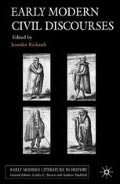Abstract
The position of the Welsh in relation to discourses of civility was volatile and ambivalent in the early modern period. Sometimes perceived by English commentators as ‘very beastly and rudely in respect of civility’,1 at other moments they were depicted as relatively good neighbours, rough and backward yet potentially educable in the ways of civility. In this essay, I take issue with Prys Morgan’s recent assertion that throughout the early modern period, the Welsh were perceived by their English neighbours as ‘wild and uncivil’.2 Rather, I contend that English representations of the Welsh were more complex and diverse than he suggests: indeed, many of the examples he offers in his essay actually demonstrate a more nuanced English account of Welsh culture than this stark assertion indicates. Morgan’s emphasis on English representations of Wales is a salutary reminder of the key part played by notions of civility in managing the difficult relations of neighbours who are forced to dwell in uncomfortable proximity.
Access this chapter
Tax calculation will be finalised at checkout
Purchases are for personal use only
Preview
Unable to display preview. Download preview PDF.
Notes
Cited in Prys Morgan, ‘Wild Wales: Civilizing the Welsh from the Sixteenth to the Nineteenth Centuries’, in Peter Burke, Brian Harrison and Paul Slack, eds, Civil Histories: Essays Presented to Sir Keith Thomas (Oxford University Press, 2000), 265–83.
Glanmor Williams, Renewal and Reformation: Wales c. 1415–1642 (Oxford University Press, 1987), p. 431.
C. Dallett Hemphill, Bowing to Necessities: A History of Manners in America, 1620–1860 (New York: Oxford University Press, 1999), p. 51.
John Taylor, A Short Relation of a Long Journey, Made Round or Oval by Encompassing the Principalitie of Wales (London, 1653), p. 18.
Ruth Geuter, “’The Silver Hand”: Needlework in Early Modern Wales’, in Michael Roberts and Simone Clarke, eds, Women and Gender in Early Modern Wales (Cardiff: University of Wales Press, 2000), 159–85.
Felicity Heal and Clive Holmes, The Gentry in England and Wales, 1500–1700 (Stanford University Press, 1994), p. 278.
Carla Mazzio, ‘Sins of the Tongue’, in David Hillman and Carla Mazzio, eds, The Body in Parts: Fantasies of Corporeality in Early Modern Europe (New York: Routledge, 1997), pp. 53–79.
Jonathan Goldberg, Sodometries: Renaissance Texts, Modern Sexualities (Stanford University Press, 1992);
Patricia Parker, Shakespeare from the Margins: Language, Culture, Context (University of Chicago Press, 1996).
Terence Hawkes, ‘Bryn Glas’, in Ania Loomba and Martin Orkin, eds, Post-Colonial Shakespeares (London: Routledge, 1998), 117–40, pp. 122–3.
Quoted in D. B. Quinn, The Elizabethans and the Irish (Ithaca: Cornell University Press, 1966), p. 13.
Edmund Spenser, A View of the State of Ireland, eds Andrew Hadfield and Willy Maley (London: Longman, 1997), pp. 75–7.
Hilda L. Smith, ed., Women Writers and the Early Modern British Political Tradition (Cambridge University Press, 1998).
See Heather Dubrow, A Happier Eden: the Politics of Marriage in the Stuart Epithalamium (Ithaca, NY: Cornell University Press, 1990).
Margot Heinemann, Puritanism and Theatre: Thomas Middleton and Opposition Drama under the Early Stuarts (Cambridge University Press, 1980), pp. 124–5, 258–60.
Editor information
Editors and Affiliations
Copyright information
© 2003 Palgrave Macmillan, a division of Macmillan Publishers Limited
About this chapter
Cite this chapter
Chedgzoy, K. (2003). The Civility of Early Modern Welsh Women. In: Richards, J. (eds) Early Modern Civil Discourses. Early Modern Literature in History. Palgrave Macmillan, London. https://doi.org/10.1057/9780230505063_11
Download citation
DOI: https://doi.org/10.1057/9780230505063_11
Publisher Name: Palgrave Macmillan, London
Print ISBN: 978-1-349-51336-9
Online ISBN: 978-0-230-50506-3
eBook Packages: Palgrave Literature & Performing Arts CollectionLiterature, Cultural and Media Studies (R0)

